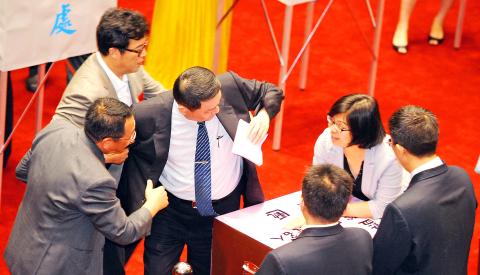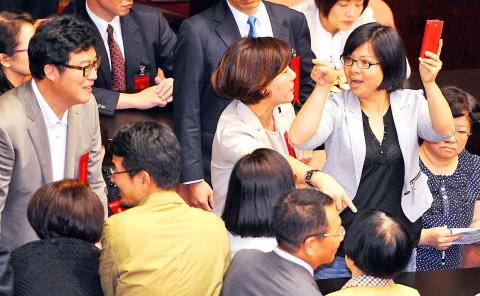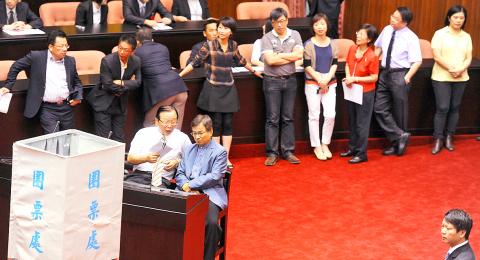An opposition blockade yesterday kept the legislature from voting on the nominations for Control Yuan members on the final day of the extraordinary legislative session after the Chinese Nationalist Party (KMT) reportedly decided to monitor its legislators’ votes to ensure they toed the party line, bringing an early end to the day’s meeting.
The Legislative Yuan had been scheduled to vote in the morning on the two nominees for president and vice president of the government watchdog and vote in the afternoon on the other nominees.
After Legislative Speaker Wang Jin-pyng (王金平) announced the start of voting, Democratic Progressive Party (DPP) lawmakers asked their KMT colleagues not to show their marked ballots to the party’s ballot overseer or other KMT lawmakers and also asked for cross-party negotiation.

Photo: Liu Hsin-de, Taipei Times
When the KMT did not respond to their requests, the DPP legislators created a roadblock by lining up to receive the ballot papers, but refusing to actually accept them and cast a vote.
From 9am to 11am — when the morning vote was scheduled to end — KMT, DPP and Taiwan Solidarity Union (TSU) legislators exchanged heated barbs in a confrontation that came close to a physical altercation.
DPP Legislator Yu Mei-nu (尤美女) said the KMT had intended to divide its lawmakers into groups of four and each group was to vote simultaneously at the four ballot boxes so they could “monitor each other’s votes.”

Photo: Liu Hsin-de, Taipei Times
While the DPP and the TSU had been the ones to initiate the blockade, not all KMT legislators were happy with their caucus’ call to push through the nominations.
“I personally think that as the roster of Control Yuan nominees this time has been widely criticized, the party should leave it to lawmakers themselves to exercise their own judgement… If the party insists on a ‘yes’ vote, the party’s prospects in the year-end elections will be greatly impacted,” KMT Legislator Chen Ken-te (陳根德) said.
KMT Legislator Lu Hsueh-chang (呂學樟) called the restriction “an insult to the lawmakers’ integrity” and the showing of marked ballots “a violation of the law.”

Photo: Liu Hsin-de, Taipei Times
The KMT and DPP held press conferences after the morning’s imbroglio. At its press conference, the KMT caucus fumed over what it said was yet another obstruction of legislative procedure by the DPP, claiming that the DPP’s interference violated Article 142 of the Criminal Code, which stipulates that “a person who … interferes with another in the free exercise of his right to vote … shall be sentenced to imprisonment for not more than five years.”
The caucus said the KMT would take legal action against DPP lawmakers.
KMT caucus deputy secretary Alex Fai (費鴻泰) said his party would call for a second extra session to vote on the Control Yuan nominations. He said the second session would be scheduled to start on July 28.
“If the second extra session does not work, there will definitely be a third or a fourth one,” Fei said.
However, the DPP said the KMT has been trying to use party discipline to “ram through the worst nominations” in Control Yuan history and refused to promise to allow a clean, supervision-free vote
DPP lawmakers cited the Criminal Code as well at their press conference.
The KMT was guilty of “procuring an incorrect result from voting or altering election returns by fraud or other illegal means,” a violation of Article 146 of the Criminal Code, and of Article 148, which prohibits a person prying into the content of a secret ballot, Yu said.
DPP Legislator Hsiao Bi-khim (蕭美琴), the caucus secretary-general, said that during cross-party negotiations last week the KMT had agreed not to oversee its lawmakers’ votes or have them show their marked ballots.
The DPP’s “technical hindrance” was simply a response to the KMT’s breach of that tacit agreement, she said.
DPP caucus director-general Tsai Chi-chang (蔡其昌) questioned the KMT’s right to accuse the opposition of violating the law and the Constitution over the nominations, reminding the KMT that it had former president Chen Shui-bian’s (陳水扁) Control Yuan nominations for as long as three years.
“We are undaunted by the KMT’s threat of a lawsuit,” Tsai said.
The KMT and its chairman, President Ma Ying-jeou (馬英九), should leave the legislature to deliberate the nominations rationally, Tsai said.

Tropical Storm Gaemi strengthened into a typhoon at 2pm yesterday, and could make landfall in Yilan County tomorrow, the Central Weather Administration (CWA) said yesterday. The agency was scheduled to issue a sea warning at 11:30pm yesterday, and could issue a land warning later today. Gaemi was moving north-northwest at 4kph, carrying maximum sustained winds near its center of up to 118.8kph and gusts of 154.8kph. The circumference is forecast to reach eastern Taiwan tomorrow morning, with the center making landfall in Yilan County later that night before departing from the north coast, CWA weather forecaster Kuan Shin-ping (官欣平) said yesterday. Uncertainty remains and

SEA WARNING LIKELY: The storm, named Gaemi, could become a moderate typhoon on Wednesday or Thursday, with the Taipei City Government preparing for flooding A tropical depression east of the Philippines developed into a tropical storm named Gaemi at 2pm yesterday, and was moving toward eastern Taiwan, the Central Weather Administration (CWA) said. Gaemi could begin to affect Taiwan proper on Tuesday, lasting until Friday, and could develop into a moderate typhoon on Wednesday or Thursday, it said. A sea warning for Gaemi could be issued as early as Tuesday morning, it added. Gaemi, the third tropical storm in the Pacific Ocean this typhoon season, is projected to begin moving northwest today, and be closest to Taiwan on Wednesday or Thursday, the agency said. Today, there would likely

DISRUPTIONS: The high-speed rail is to operate as normal, while several airlines either canceled flights or announced early departures or late arrivals Schools and offices in 15 cities and counties are to be closed today due to Typhoon Gaemi, local governments announced last night. The 15 are: Taipei, New Taipei City, Taoyuan, Tainan, Keelung, Hsinchu and Kaohsiung, as well as Yilan, Hualien, Hsinchu, Miaoli, Chiayi, Pingtung, Penghu and Lienchiang counties. People should brace for torrential rainfall brought by the storm, with its center forecast to make landfall on the east coast between tonight and tomorrow morning, the Central Weather Administration (CWA) said. The agency issued a sea warning for the typhoon at 11:30pm on Monday, followed by a land warning at 11:30am yesterday. As of

CASUALTY: A 70-year-old woman was killed by a falling tree in Kaohsiung as the premier warned all government agencies to remain on high alert for the next 24 hours Schools and offices nationwide are to be closed for a second day today as Typhoon Gaemi crosses over the nation, bringing torrential rain and whipping winds. Gaemi was forecast to make landfall late last night. From Tuesday night, its outer band brought substantial rainfall and strong winds to the nation. As of 6:15pm last night, the typhoon’s center was 20km southeast of Hualien County, Central Weather Administration (CWA) data showed. It was moving at 19kph and had a radius of 250km. As of 3pm yesterday, one woman had died, while 58 people were injured, the Central Emergency Operation Center said. The 70-year-old